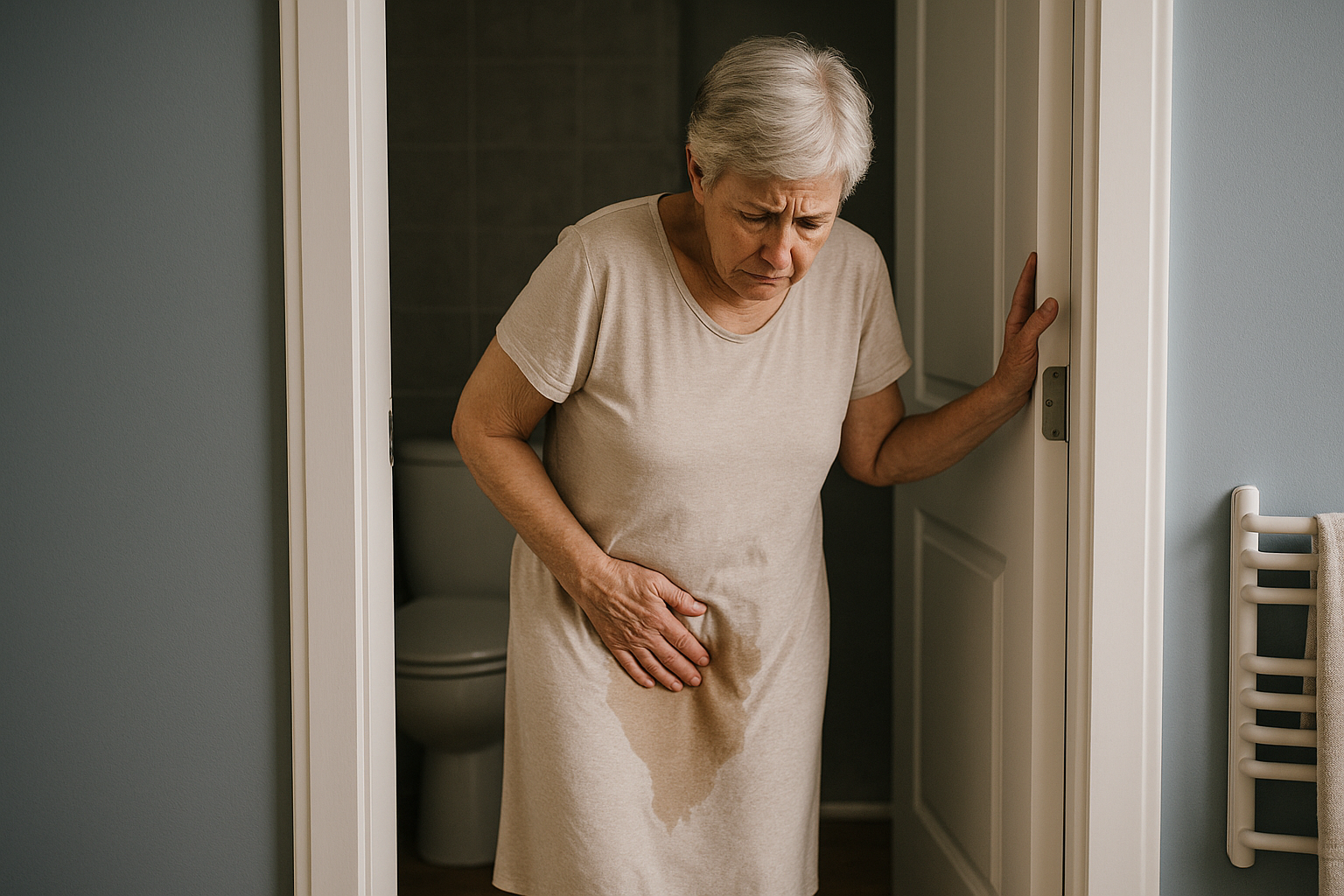If you're one of the many women who find themselves waking up multiple times a night just to pee — you're not alone, and you're definitely not imagining things.
Whether it’s one trip or four, those nightly wake-ups can leave you feeling drained, frustrated, and anything but rested.
And here’s the kicker — the older we get, the more common it becomes.
But that doesn’t mean we should just accept it and suffer through it.
Let’s break down why this happens, and more importantly, what you can start doing tonight to stop the cycle.

First, What’s Going On?
That repeated urge to pee at night is called nocturia.
It’s surprisingly common, especially in women over 40, women who’ve had kids, or anyone dealing with pelvic floor issues.
According to the Cleveland Clinic, nocturia can stem from several causes:
-
Hormonal changes (thanks, menopause)
-
Weak pelvic floor muscles
-
Sleep disorders
-
Bladder irritants in your diet
-
Conditions like prolapse or overactive bladder
And while it might seem like “just a nuisance,” it can actually impact your sleep quality, mood, memory, and immune function over time.

Why It’s Worse for Women with Prolapse or Bladder Leaks
Women experiencing prolapse — where pelvic organs like the bladder shift downward — are more likely to wake up with an urgent need to pee.
That’s because prolapse can compress or shift the bladder, causing incomplete emptying or extra pressure.
A study published in Urology and Continence Care Today emphasized how pelvic organ descent significantly increases urinary frequency and urgency, especially at night.
Pelvic floor physical therapist Dr. Amanda Olson, DPT, adds:
“Many women with pelvic organ prolapse experience nocturia due to the added pressure on the bladder — especially when lying down. That positional change can make symptoms worse.”
(Source)

Nighttime Routines That Actually Help
Here’s the good news: small changes in your nighttime habits can make a big difference.
Think of it as giving your bladder a bedtime routine — just like the rest of your body.
1. Cut the Fluids (Strategically)
Drink plenty of fluids during the day, but taper off 2–3 hours before bed.
This helps reduce how much urine your body produces at night.
Also, skip these in the evening:
-
Alcohol (a diuretic and bladder irritant)
-
Coffee or tea
-
Citrus juices
-
Carbonated drinks

If you're looking for a gentle way to support your bladder in the background, Purivon’s Bladder Control Patches are worth a look.
They use a natural topical delivery system that slowly supports bladder control overnight — and many women say they help reduce those disruptive 2 a.m. bathroom runs.
No internal supplements, no harsh effects — just an easy, calming option to explore.

2. Elevate Your Legs Before Bed
Here’s a little trick most people don’t know: lying down causes fluid from your legs to redistribute. That fluid becomes urine.
So, about 1–2 hours before bed, try lying down with your legs elevated (on pillows or a recliner).
This helps your body process that fluid before you fall asleep.
This tip is even recommended by urologists and discussed in this Health.com article.
3. Strengthen Your Pelvic Floor
Yes, Kegels again — but they work. Especially for women with prolapse or leaks.
According to Physical Therapy Your Way:
“Pelvic floor strengthening has been shown to significantly reduce nocturia and urgency episodes in women.”
 If you struggle to stick to a routine or you’re unsure you’re doing Kegels right, a device like The PelviTone™ might be helpful.
If you struggle to stick to a routine or you’re unsure you’re doing Kegels right, a device like The PelviTone™ might be helpful.
It’s a gentle at-home pelvic trainer designed to guide and activate the right muscles — so you’re not just guessing.
Women dealing with prolapse have reported feeling more supported and noticing fewer bathroom wakeups after using it consistently.

4. Warm, Calm, and Wind Down
This isn’t just about your bladder — it’s about your nervous system, too.
Stress and poor sleep make bladder symptoms worse. So:
-
Keep your room dark, cool, and quiet.
-
Stick to a regular bedtime.
Do a calming activity (stretching, breathing, reading — not scrolling TikTok in bed).
If pelvic pressure is part of your struggle, especially while lying down, using a Prolapse Pressure Relief Pillow can help.
Designed to gently support your hips and reduce downward pressure, many women say it makes side sleeping more comfortable — which can, in turn, improve sleep quality.
It’s a small switch that might make a big difference.

When Should You See a Doctor?
If you’re waking up more than twice per night — consistently — even after trying these habits, it’s worth talking to a urogynecologist or pelvic floor therapist.
Nighttime urination might be a symptom of something deeper like:
-
Bladder dysfunction
-
Hormonal imbalance
-
Incomplete bladder emptying
-
Even sleep apnea (which many women don’t realize they have)
Don't just power through it.
There's no badge for suffering in silence — especially when treatment options exist.
 A Gentle Note Before You Head to Bed
A Gentle Note Before You Head to Bed
If you've been feeling embarrassed, tired, or frustrated about waking up to pee every night — please know this: you're not weak, you're not failing, and you’re certainly not alone.
Your body is communicating with you, and there’s nothing shameful about listening.
There are quiet, practical things you can start doing to support yourself — no need for drastic changes or overnight miracles.
It's about making small choices that add up. Maybe it's elevating your legs.
Maybe it's switching your tea for water.
Maybe it's just realizing… this isn’t just “normal aging” — this is something you’re allowed to get help with.
You deserve restful sleep. You deserve to feel comfortable in your body.
And you deserve to wake up feeling strong, not exhausted.
Whatever step you choose next, let it be one that feels kind to yourself.





Share:
Can Prolapse Get Better Naturally? What the Research Says About Non-Surgical Support
Standing, Sitting, Lifting: Everyday Movements That Strain Your Pelvic Floor